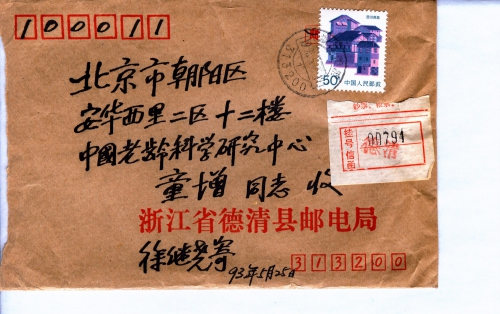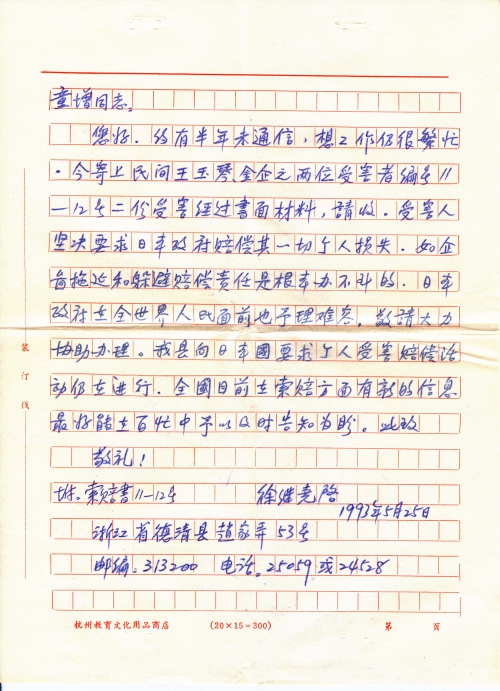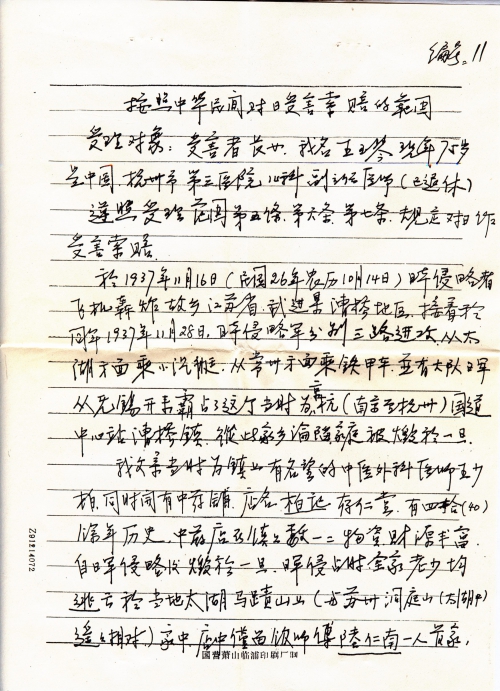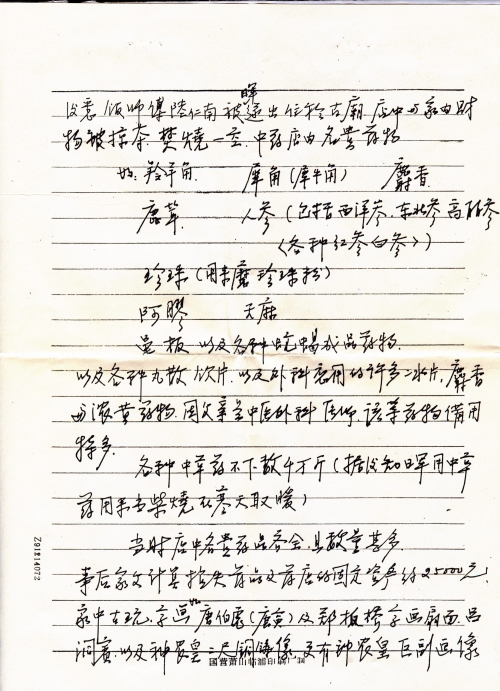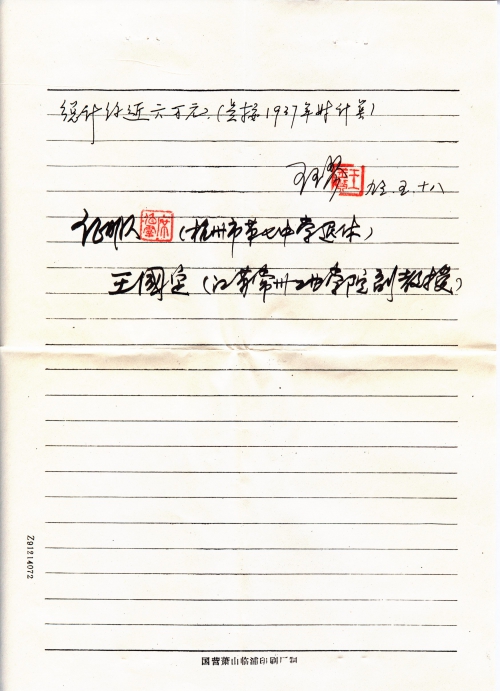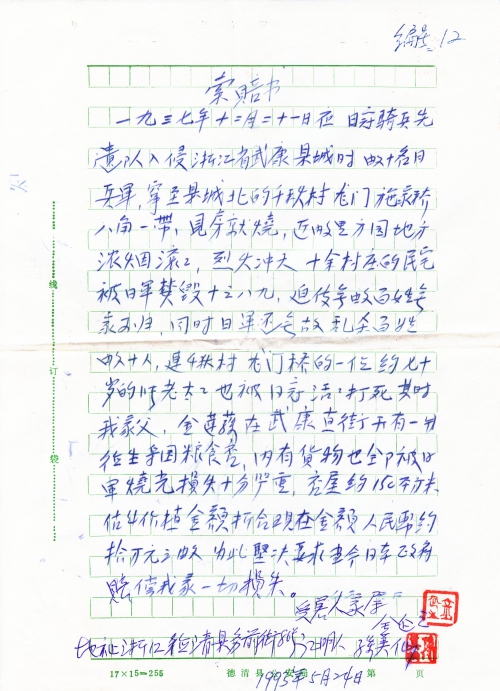Date of Letter:1993-05-25
Address of Author:Deqing County, Zhejiang Province
Date of Event:1937
Location of Event:Jiangsu Province; Wukang County, Huzhou City, Zhejiang Province
Name of Author:Xu Jiyao, Wang Yuqin, Jin Qizhi, Sun Meixian
Name(s) of victim(s):Wang Yuqin’s father, Jin Pingsun (Jin Qizhi’s father), Jin Qizhi’s fellow-villagers
Type of atrocity:Air bombings, Others, Other Massacres (AB, OT, OM)
Other Details:”I (Xu Jiyao) now send you the victim information of Wang Yuqin and Jin Qizhi. Please offer support.In 1937, the Japanese bombed my (Wang Yuqin’s) hometown Jiangsu Province, and also burnt the medicine store run by my father. On December 21, 1937, the Japanese army invaded Wukang County, Zhejiang Province, where they burnt houses everywhere, killed dozens of civilians and beat an old woman of over 70 to death.
My (Jin Qizhi’s) father Jin Pingsun’s food for food business were also burnt. “”
Mr. Tong,
Hello!
We have not communicated for about half a year; I figure you are still very busy. Today I am sending you two documents regarding the suffering details of two victims, Wang Yuqin and Jin Qizhi, case numbers 11 and 12. The victims strongly demand that the Japanese Government indemnify all their personal losses. The Japanese Government simply cannot put off or avoid the liability of reparation; people all over the world will not tolerate such preposterous behavior. Please do your best to help. The campaign of claiming civil reparations against Japan in our county is still in progress. If there is any new information concerning the claim nationwide, please let us know.
Attached: Reparation Claim case number 11 and 12
Sincerely,
Xu Jiyao
May 25, 1993
No. 53, Zhaojia Alley, Deqing County, Zhejiang Province
Postcode: 313200 Tel: 25059/24528
Case number 11
May18, 1993
According to the Republic of China’s Scope of Reparation Claim against Japan
Beneficiary: Victim’s oldest daughter, Wang Yuqin, 75 years old, associate chief doctor of pediatrics, Hangzhou No.3 Hospital (retired).
Complying with Scope of Acceptance Articles 5, 6, and 7 to claim reparation for victims against Japan
On November 16, 1937 (lunar calendar October 14, Year 26 of the Republic of China), the Japanese air force bombed my hometown in Caoqiao, Wujin prefecture, Jiangsu Province. On November 28th of the same year, the Japanese invaders attacked from three different routes: motor boats from Taihu, armored cars from Changzhou, and the main force from Wuxi. They occupied Caoqiao Town, which was a key station on Jinghang (Nanjing to Hangzhou) National Highway at that time. After that, my hometown was in enemy’s hands and my family was destroyed in time.
My father, Wang Shaobo, was a renowned traditional Chinese surgeon in town and had owned a Chinese pharmacy called Bojicunren Tang for over 40 years. The pharmacy was a top 1 or 2 supplier with rich resources but all were destroyed by the Japanese invaders. During Japanese occupation, the family fled to Taihu Maji Mountain (facing Suzhou Dongting Mountain from a distance). Only the cook, Lu Rennan, stayed as a care taker of the home and the store. Later, we learned that cook Lu Rennan was expelled by the Japanese army to an ancient temple. The house and the store, including rare, valuable medicines as shown below, were ransacked and then burned.
Precious and expensive medicines such as:
Antelope Horn, Rhino Horn, Musk,
Pilose Antler, Ginseng (including American ginseng, Northeast ginseng, Korean ginseng ),
Pearl (used to grind into pearl powder),
Colla corii asini (Ejiao), Gastrodia elata,
Tortoise Plastron and various kinds of medicine made from snakes and scorpions,
There were also all kinds of pills, powders, potions, tablets, and a lot of borneols, musks, and reddish yellow medicines for surgical use. Since my father was a traditional Chinese surgeon, he had prepared large amounts of such medicines.
There were various kinds of Chinese herbal medicines weighing more than tens of millions of jins (1 jin = 500 grams). (Later we learned that the Japanese army had used these medicines as fuel to warm themselves in cold weather).
Since there were various large amounts of rare valuable Chinese herbal medicines in the pharmacy, plus pharmacy’s fixed properties, my father estimated the total loss to be around 25,000 yuan. In addition, losses in the home included the antiques, ancient calligraphy and paintings such as the scripts and paintings of Tang Bohu (Tang Yin) and Zheng Banqiao, 2-foot bronze statues of Lv Dongbing and Emperor Shennong, and a large portrait of Emperor Shennong, altogether worth nearly 60,000 yuan (calculated based on their values in 1937).
Wang Yuqin (name seal)
Testifier:
Xi Baiqin (name seal) (retired from Hangzhou No. 7 Middle School)
Wang Guoding (associate professor of Changzhou Institute of Technology, Jiangsu)
Case number 12
Reparation Claim
In the night of December 21, 1937, when the Japanese advance cavalry forces invaded Wukang County, Zhejiang Province, dozens of Japanese soldiers charged into Longmen, Shijia Bridge, and Bajiao area, in Qianqiu Village, north of the county seat, and burned all the houses they could see. Dark smoke billowed and flames soared around the area of several square lis (1 li = 500 meters). 80 to 90 percent of the residences in more than ten villages were burned and destroyed, rendering innumerous villagers homeless. At the same time, the Japanese army murdered dozens of civilians for no reason, including beaten to death a 70-year-old lady, Mrs. Zhang, who was from Longmen Bridge, Qianqiu Village. At that time, my father, Jin Liansun, owned and operated the Deshengcaiyuan food store on Zhi Street, Wukang. The Japanese army burned the store, including all merchandises. The loss was sweeping. The store was about 150 square meters, estimated to value 10,000 RMB now. Therefore, I strongly urge the current Japanese Government to compensate all the losses for my family.
The family of the victim
Jin Qizhi (name seal)
Address: No. 80, Wuqian Street, Deqing County, Zhejiang
Testifier: Sun Meixian (name seal)
May 24,1993














